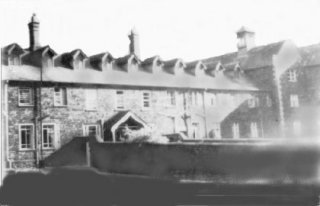No relief from poverty in Ireland existed before the 1840s, when 106 Poor Law Unions were established throughout Ireland. Newry Union, one of the largest and covering an area roughly equivalent to that of Newry and Mourne Council, provided indoor relief for 1,000 paupers. The Clerk of the Union and the Master who worked under him were expected to minimise the charge on the rates by making conditions within as harsh and uninviting as possible. The evicted, orphans, the homeless, the ill and infirm and the handicapped who reluctantly became inmates might, if they were fortunate, find in the Union’s medical officer a sympathetic advocate and friend. It rarely happened.
William Alexander Davis was the first medical officer appointed to serve in Newry Union Workhouse, newly opened in 1841. In addition to his poorly-rewarded duties there, he served as doctor to the townspeople. He resided in the town centre, first at 4 Sugar Island and later at Barrack Street. A member of the Church of Ireland community (he is buried in the COI cemetery) he was acclaimed and highly respected by everyone, regardless of religion. A very moving tribute was paid on his demise by the then Editor of the Newry Reporter (see NR 13 Nov 1877).
Although medical officers in many other Unions disdained their charges and spent as little time as possible in the Workhouse, Davis from the outset distinguished himself as a very able, dedicated and committed champion of the poor. The Minutes of the Boards of Guardians, especially for the first decade of their existence while famine raged and while he first served in this post, are interspersed with his anxious but strongly argued solicitations on the part of the pauper inmates. He had no power to demand the minimal requirements he considered necessary for the inmates’ needs and indeed for their very survival. Although the Board of Guardians was strongly opposed to recommendations that required increased spending, Davis nevertheless fearlessly argued their case, and not only in his primary medical field but he demanded also better food, clothing and other facilities for those in his care.
While carrying out his Workhouse duties he contracted a serious infectious disease, but he insisted that at the earliest opportunity he return to minister to the paupers. He served a further twenty-eight years as Workhouse doctor, enhancing his reputation as chief spokesman of the voiceless and dispossessed. It is a measure of the huge esteem in which he was held that even the parsimonious Board, ever the object of his unceasing demands on behalf of the poor, paid tribute to his dedication, acclaiming
‘..we have never heard a complaint against him for neglect of duty, but know him to be a favourite with the paupers for his kind humour and attentive conduct..’
We believe that Davis, in his own way and time, did as much for the poor, dispossessed and destitute of South Armagh, Newry and Mourne as in the early twentieth century, that other great Irishman of Newry roots, Big Jim Larkin, did for the working class people of these islands.
Since Davis’s term of office coincided with the most terrible period of Ireland’s history, the Great Famine, when up to a million died of disease and starvation, his labours on behalf of the poor and homeless of Newry and district were both timely and vital, and should never be forgotten.
He continued to serve throughout the traumatic post-Famine, land-clearance and mass emigration (much of it ‘forced’) period.
It is the strong opinion of the Newry Journal that our new Social Security Office ought to be named and dedicated in his honour.
{P.S. This didn’t happen. Phoenix House being preferred. ]
“Workhouse Nurse” is here …

1 thought on “History of Newry Workhouse: Wm Alexander Davis”